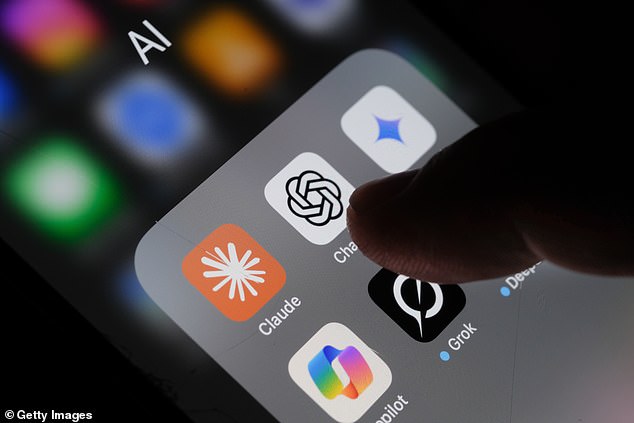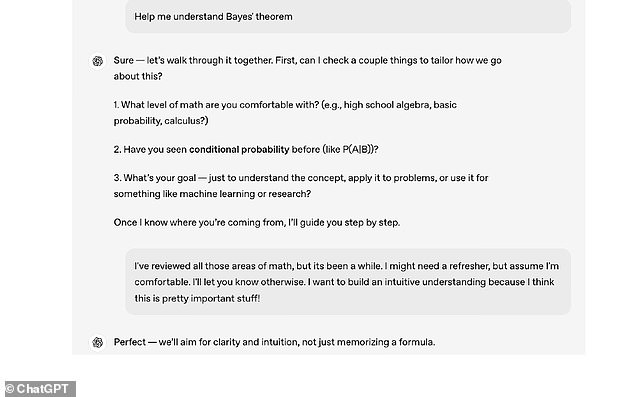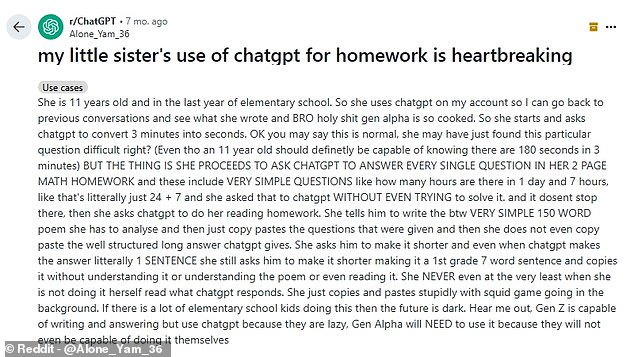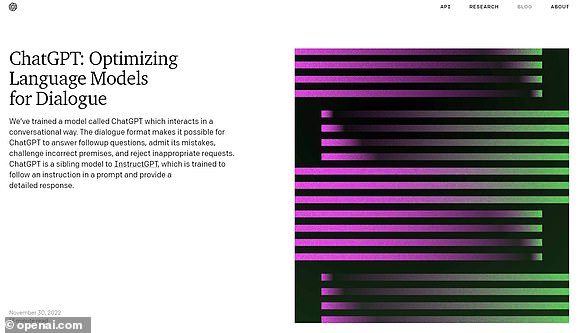Homework used to be something that could take hours.
But the recent introduction of ChatGPT means tricky questions or complicated essays can be completed in the click of a button.
It can undoubtedly be helpful in certain situations – like if a student is really stuck on a topic.
But frustrated family members and teachers have complained that youngsters are using the AI chatbot as a ‘second brain’ and to answer simple questions like ‘how many hours are there in one day?’
However, a new update could help reach a happy middle ground.
OpenAI, the firm behind ChatGPT, has just announced ‘study mode’ – an option which will help users work through questions step by step instead of just providing an answer.
Students who tested the mode have described it as a ‘tutor who doesn’t get tired of my questions’ and said it is helpful for breaking down dense material.
The tool contains interactive prompts to guide understanding, ‘scaffolded responses’ to reduce overwhelm and personalised support that is tailored to the right level for the user.

The recent introduction of ChatGPT means tricky questions or complicated essays can be completed in the click of a button (stock image)

An example of how ‘study mode’ would work. Experts say it is ‘especially useful’ for homework help, test prep and learning new topics
It also features knowledge checks in the form of quizzes and open–ended questions, along with personalised feedback.
The mode can also easy be toggled on and off during a conversation. Those wanting to use it should select ‘Study and learn’ from tools in ChatGPT.
‘Instead of doing the work for them, study mode encourages students to think critically about their learning’, Robbie Torney, senior director of AI Programs at Common Sense Media said.
‘Features like these are a positive step toward effective AI use for learning.
‘Even in the AI era, the best learning still happens when students are excited about and actively engaging with the lesson material.’
It’s hoped the latest update will prevent students from over–reliance on AI when it comes to learning.
One person previously described their sister’s use of ChatGPT for homework as ‘heartbreaking’.
Writing on Reddit the user, called ‘Alone_Yam_36’, said: ‘She is 11 years old and in the last year of elementary school.

Frustrated family members and teachers have complained that youngsters are even using the AI chatbot to answer simple questions like ‘how many hours are there in one day’ (stock image)
‘She uses ChatGPT on my account so I can go back to previous conversations and see what she wrote.
‘So she starts and asks ChatGPT to convert three minutes into seconds. But the thing is she proceeds to ask ChatGPT to answer every single question in her two–page math homework.
‘These include very simple questions like how many hours are there is one day and seven hours. She asked ChatGPT without even trying to solve it.
‘If there’s a lot of elementary school kids doing this then the future is dark.’
Another person said: ‘For many of us it’s a tool. For a lot of people – and the younger generation – it looks like it’ll be their second brain (if not their main), which is very concerning.’
While one pointed out: ‘She’ll learn her lesson when she starts failing exams.’
Schools in the UK have previously said they are looking to move away from homework essays due to the power of online artificial intelligence.
Staff at Alleyn’s School in southeast London are rethinking their practises after a test English essay produced by ChatGPT was awarded an A* grade.

This Reddit user described their young sister’s use of ChatGPT for homework as ‘heartbreaking’
Meanwhile, around three–quarters of students admit to using AI to help with homework.
A recent survey commissioned by Berkshire–based independent girls’ school Downe House saw 1,044 teenagers aged 15 to 18, attending both state and private schools across England, Scotland and Wales, polled about their own use and views of artificial intelligence earlier this year.
More than three quarters (77 per cent) of those who answered admitted to using AI tools to help complete their homework.
One in five admitted regular use, with some saying they felt disadvantaged if they did not use it.
In a recent blog post on AI in schools, the Department for Education wrote: ‘AI tools can speed up marking and help teachers understand each pupil’s progress better, so they can tailor their teaching to what each child needs.
‘This won’t replace the important relationship between pupils and teachers – it will strengthen it by giving teachers back valuable time to focus on the human side of teaching that makes all the difference to how well pupils learn.’

